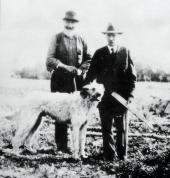
Peter Erasmus was a Métis trader, guide, hunter, translator, Indian agent, farmer and mission worker involved in many of the notable historical events in western Canada in the late 1800s. Born in 1833 to Danish-Cree parents, he was well educated and worked with his uncle the Reverend Henry Budd at The Pas, translating Scripture. It is recorded that Erasmus was fluent in six Aboriginal languages in addition to English, Latin, and Greek. Because of these skills Erasmus was recognized as an able translator and played this key role in many critical cross-cultural encounters. He assisted a number of Christian missionaries, especially the Methodists, and was also chosen by the Earl of Southesk and by Captain John Palliser as official translator for their famous expeditions. These travels gave him an intimate knowledge of the entire land and of the Aboriginal groups between Lake Superior and the Rocky Mountains. In the early 1860s Erasmus married Charlotte Jackson, a young Métis woman, and they had six children before her death in 1880.
In 1876 Cree Chiefs Mistawasis and Ahtahkakoop hired Erasmus to interpret for them at the Treaty 6 negotiations at Fort Carlton. He was subsequently hired by the Canadian government's Treaty Commissioner, Alexander Morris; this left him open to charges of sharp dealing. Erasmus was privy to some of the deliberations among the Aboriginal leadership, noting the authority of Mistawasis and Ahtahkakoop and their support for the treaty; he further recorded that Poundmaker and The Badger spoke strongly against signing. Erasmus also made it clear that he personally supported the treaty. Erasmus subsequently worked in a number of capacities for the Indian Department, and attempted to play a mediating role in the events leading to the 1885 conflict in Batoche. He settled near Whitefish Lake in what would become Alberta, continuing to trap and trade as well as farm until his death in 1931 at the age of 97. At age 87, Erasmus told his story to a Métis journalist and the resulting manuscript found its way to the Glenbow Archives. Published in 1976 as Buffalo Days and Nights, it is a critical first-hand historical source for this period of great change in the Canadian west.
Michael Cottrell